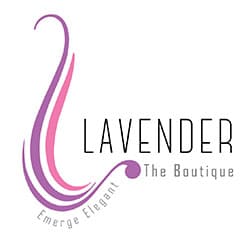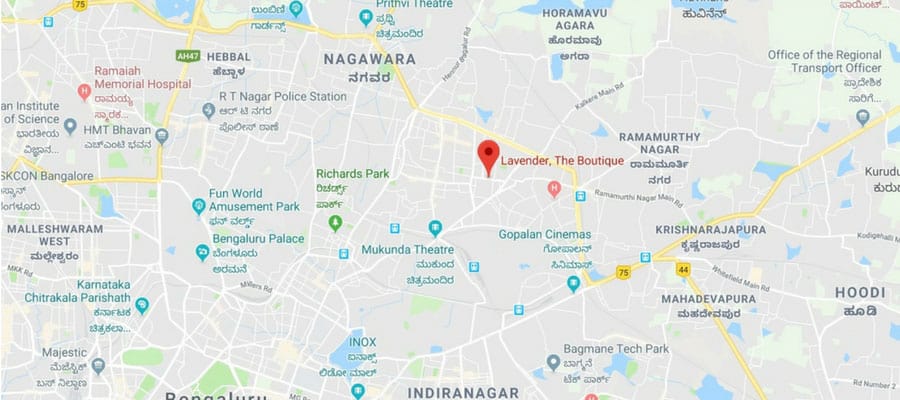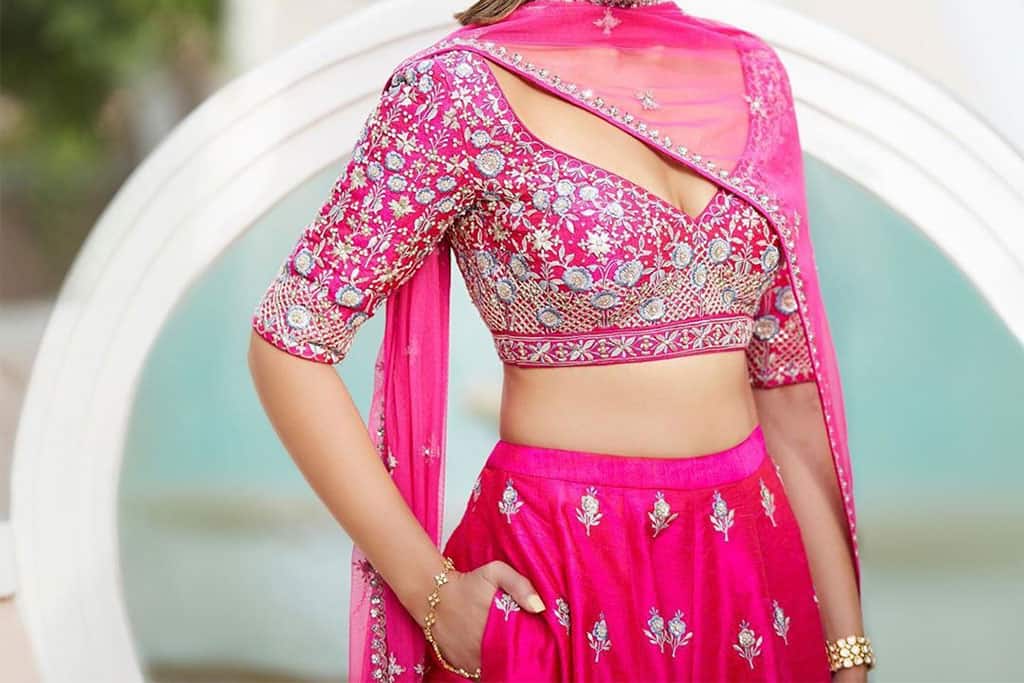
couture Process
Blouses
Be it a stunning silk saree, a wedding lehenga, or an Indo-western skirt, a tailor-made blouse is what truly adds personality to the outfit. We create such masterpieces!
A well crafted blouse gives the wearer the freedom to express their sense of style by playing around with different blouse patterns, fabrics, and embellishments. Replacing a plain blouse in a solid colour with an embellished blouse in a contrasting shade to your saree or lehenga can completely transform the look of the ensemble. However, choosing the wrong blouse design, fabric or colour can be a recipe for disaster and can ruin the overall look of the entire outfit. Here is a step-by-step guide on how we design the perfect blouse for any outfit and occasion by customizing each detail of the garment for the most flattering outcome
Step 1. Choosing the Design and Embellishments
The first step of the blouse designing process is to choose the style of each of the elements of the blouse. These elements include the neckline, the sleeves, the length and the cut of the blouse, to name a few. If you have a vision of the overall vibe you want to go for with the outfit, it will help us select the best style for your blouse. Images of blouse designs that you like, the dress code for the occasion, your body type, and the weather can all help us narrow down on the final design elements of the blouse. As an example, for a traditional temple wedding, a round neckline with elbow length sleeves is an appropriate choice while for a party wear lehenga, you may want to go for something bolder like an off-shoulder blouse. Here are some tips on how to select these key design elements of your blouse
The front and back necklines are arguably the most important design elements of the blouse because they tend to attract the most attention. You can go for similar styles of necklines for the front and the back or can opt for a statement front or back neckline while keeping the other one simple
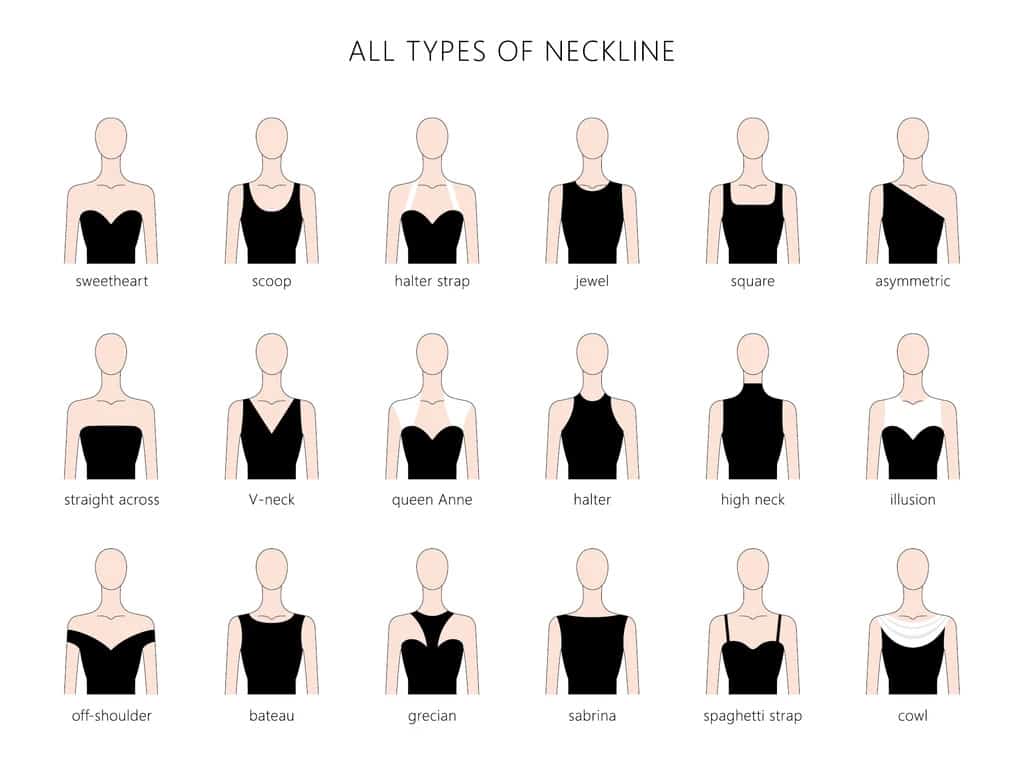
The conservative options for front necklines include the round neck, the V-neck, the Square neck and the U-neck, the depth of which can be adjusted as per your preference. A high neck, a Queen Anne neckline or a Mandarin neckline can add vintage elegance to the blouse whereas a sweetheart neckline or a halter neck are the best ways to show off your collar bones
If your pallu or dupatta is not going to cover your back or is sheer then a statement back neckline can make your blouse stand out in an alluring manner. You can play around with different string styles, such as a cross-stringed pattern or a double dori, if you wish to show off your back
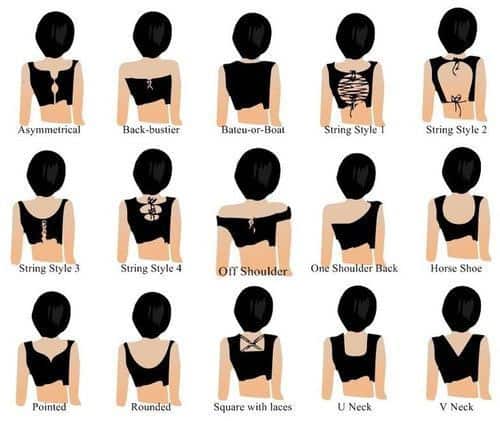
A keyhole back is also an excellent statement option that can be customized as per the amount of coverage you are comfortable with. An illusion back made of sheer material is another great choice if you do not want to bare your skin but still want your blouse to be a head-turner
If you are blessed with a great pair of collar bones then why not flaunt them in an off-shoulder blouse? A bandeau, one-shoulder blouse or a blouse with spaghetti straps will draw attention to your neck and shoulders and can be complemented further with a statement choker necklace.
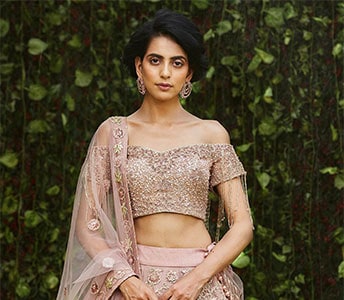 These styles look particularly stunning with crop top lehenga sets and party wear lehengas for cocktails and sangeets
These styles look particularly stunning with crop top lehenga sets and party wear lehengas for cocktails and sangeets
A statement sleeve style can jazz up your outfit if your saree or lehenga skirt is relatively plain or contains subtle design elements. Bell sleeves or flounce sleeves can add a vintage look to the ensemble whereas flowy cape sleeves or butterfly sleeves add a whimsical element that also conceals heavier upper arms. On the other hand, if you have toned arms that you wish to flaunt then cap sleeves will work well for you. If you have thin arms and toned shoulders then puff sleeves or balloon sleeves will complement these features really well whereas tulip and ruffle sleeves have a slimming effect on the arms while looking incredibly feminine
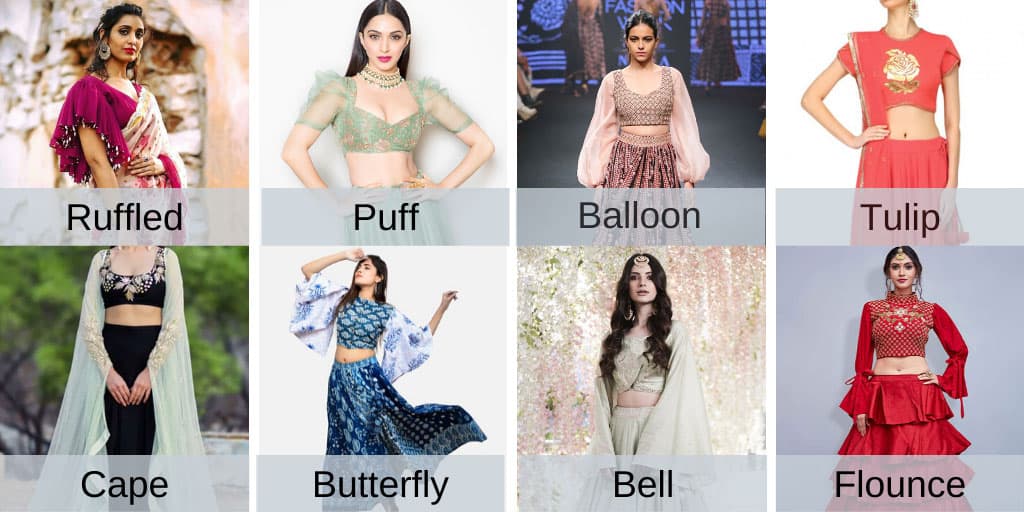
Remember to maintain a balance between the lehenga skirt and the blouse – if there is too much can-can in your lehenga then opt for simpler sleeves to prevent looking too poofy. For wedding lehenga blouses, you may want to avoid long and flowy statement sleeves if you are going to perform rituals near a fire, as you wouldn’t want to risk the fabric coming in contact with the flame
The ideal length of the sleeve of your blouse will depend upon several factors. First and foremost, you need to decide whether or not you wish to flaunt your upper arms, as some people are more comfortable with sleeves that cover this area. Secondly, how you plan to drape your saree or dupatta will also give you a fair idea of how much your sleeves should be visible through the drape. In terms of weather and dress codes, you may want to opt for cap sleeves or a sleeveless blouse for daytime, summer occasions and 3/4th or bracelet sleeves for winter events or formal events with a traditional dress code
The length of the blouse needs to be determined based on your body type while maintaining a balance between the lower and upper halves of the outfit
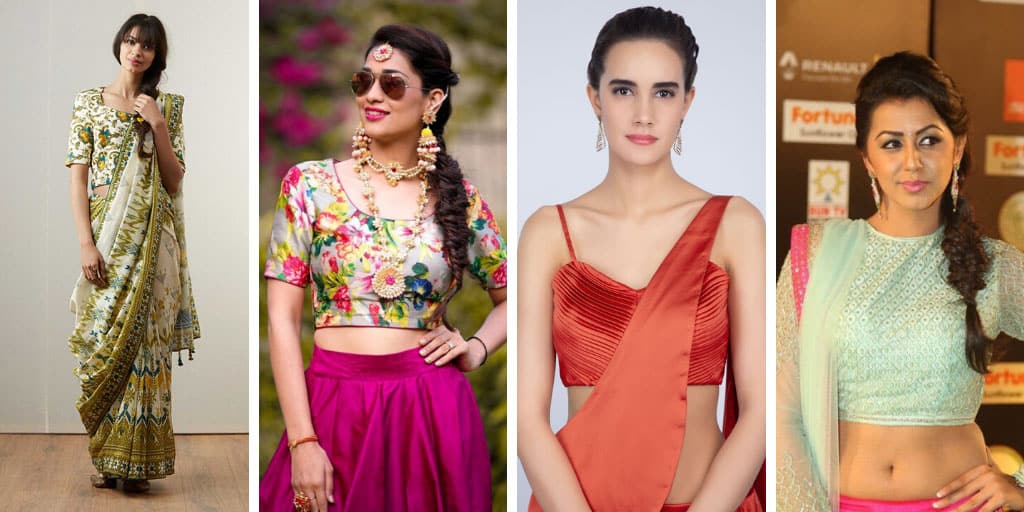
If you wish to draw attention away from your waistline then you can opt for a long blouse that will give you a slimmer appearance. If your lehenga or skirt is high waisted then you can opt for a crop top style blouse to give a longer appearance to your legs or you can even opt for a bustier-style to flaunt your curves and give a longer appearance to your torso. With a mid-waisted lehenga, skirt or saree, a regular blouse length of 14-16 inches is a safe choice that does not bring too much attention to the waist region and provides ample coverage
A padded or unpadded blouse, now is the time to take a call. While padded blouses add the convenience of not having to wear a bra with the outfit, if they do not fit you well, they can lead to a wardrobe mishap. Here are some tips from our expert designers on how to get the design of a padded blouse right
The cut of a blouse refers to how the fabric is cut to create the desired shape in the bust area, which essentially means that different cuts have different placement of visible seams in the bust region
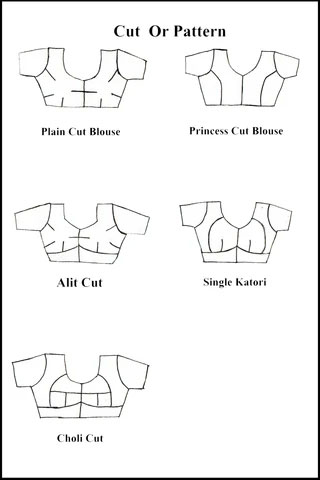 You can choose from the most popular cut, which is the princess cut, or select single dart or half katori, based on how much you wish to highlight the bust area. Ask our designer to suggest the best cut as per your body type and your outfit
You can choose from the most popular cut, which is the princess cut, or select single dart or half katori, based on how much you wish to highlight the bust area. Ask our designer to suggest the best cut as per your body type and your outfit
The opening of the blouse refers to where the zippers, hooks or fasteners go. Ideally, one should choose between a front, side, or back opening such that the pallu hides the hooks or zippers, but fancy buttons or zippers can also be added to enhance the beauty of the blouse. Also, if you are placing your embellishments or embroidery on the front half of the blouse then the opening is typically added at the back or the sides, and vice-versa

You can even opt for modern-age concealed zippers that do not interfere with the design and do not create gaps in the fastening unlike traditional buttons or hooks
Embellishments are what add life to plain fabric and can transform a simple blouse into a head-turner. You can opt for customized embroidery or borders to add a regal look to your blouse for a special occasion. On the other hand, latkans or tassels at the back of the blouse add a youthful touch to a wedding lehenga
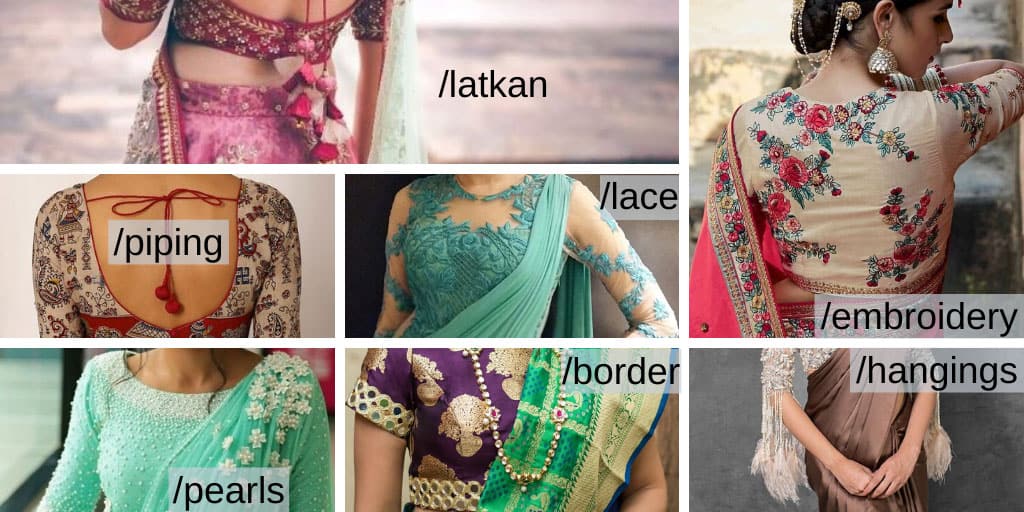
Embellishments such as bead hangings, tassels and fringes can also be added to the sleeve borders, which adds to the beauty of the blouse while being more affordable than embellishments or embroidery all over the blouse. Here are some examples of how embellishments can be used to create a statement blouse
Step 2. Fabric Selection
Design Finalization & fabric selection typically goes hand-in-hand. You may want to go ahead and use the blouse material that came with your saree or lehenga or may combine it with another fabric or choose a different fabric altogether for a statement look. In case you are buying the blouse fabric separately, avoid stiff or hard fabrics else the blouse will appear raised from the body. Both Silk and Cotton fabrics work best for the blouse. Depending upon your Saree or Lehenga, you could also go for a Printed Fabric or a Brocade fabric to add some variety. Take the help of our designer to select the most fitting fabric for the weather and occasion, which will complement the material of the rest of your outfit too
Colour selection of the blouse fabric is of utmost importance too, so that you do not end up with a mismatched colour palette. Take tips from your designer to choose the right contrasting or complementary colour for your blouse
You also have an option to get it dyed in a specific color – Choose any colour from the Dye Shade Card & we get it dyed in exactly the same colour. We engage a specialist dyer who uses Premium Quality Dye & Modern Techniques, so that the colour is thorough, is long lasting & does not fade with any number of washes
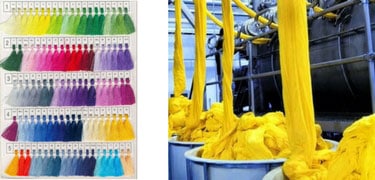
Lining Fabric Selection
The designer can also recommend the appropriate lining for the blouse if it is needed. A lining is essential if the fabric is thin and transparent like georgette, or contains prickly embroidery or sequin work.
A comfortable fabric like cotton or linen is recommended, but cotton needs to be pre-washed to prevent shrinking of the blouse at a later stage, whereas linen does not shrink and should be opted for if you are in a rush to get the blouse stitched. At our Boutique, we save the botheration for our customers, by always using pre-shrunk premium quality lining
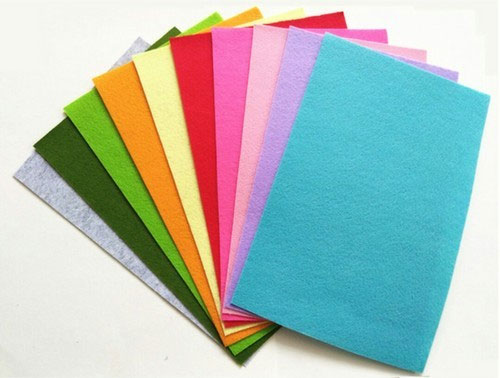
Step 3. Measurement & Fittings
An ill-fitting blouse is one of the biggest fashion faux pas that you can commit. Cups that don’t sit right, sagging fabric, or sleeves that are a bit too tight can completely destroy the look of the blouse no matter how high in quality the fabric and embellishments may be
While we make sure that we take your measurements correctly, you need to ensure that you are ready for your measurements & come prepared for your fitting sessions. Here is some guidance for the same
Following aspects of Blouse construction at Lavender, The Boutique ensures that you always get a Perfect Fitting blouse with a premium finish, which is durable & lasts longer
1. Comprehensive Fit Profile
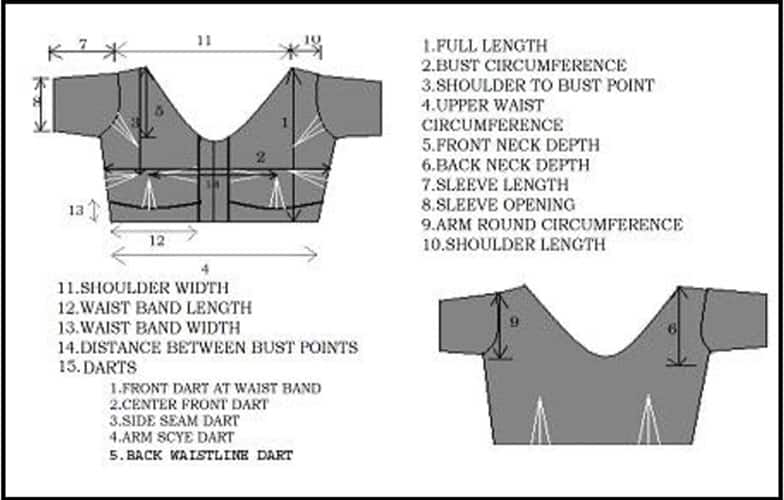
We customize the fit of the blouse to your unique measurements with a comprehensive 15-Point Fit Profile, that is completely unique to your figure. This ensures your true natural fit, with no drooping shoulders, tight armholes, ugly creasing or flattening of the chest, which can otherwise be caused by standard tailor like measurements. We also recommend the right undergarments when being measured, to get the most accurate measurements for a Perfect Fit
2. Professional Seamstress
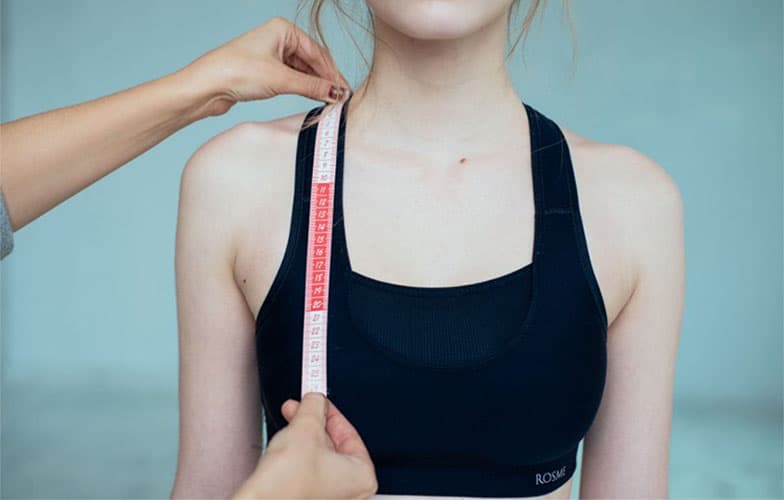
Sometimes, you may not be able to visualize properly how deep the front and back necklines are going to be, and may end up being uncomfortable with the design of the blouse after it is stitched. We avoid this problem altogether by having a professional seamstress take your measurements. She would clearly point out each measurement of the blouse to you and will show you where the necklines will lie on the front and the back, so as to ensure that you are happy with the length and depth of the blouse
3. International Standard Trims

For padded blouses, we use international quality bra cups, similar to the ones used by premium brands such as Jockey and Enamour. We also use export quality Zippers & Threads for durability. Inner Lining is always double lining – which is pre-shrunk to prevent any shape distortion of the blouse post washing and to enhance its durability. For thin or light-coloured fabrics, we use high-quality crepe lining instead of regular cotton lining, for a seamless finish and fit
4. High Quality Construction
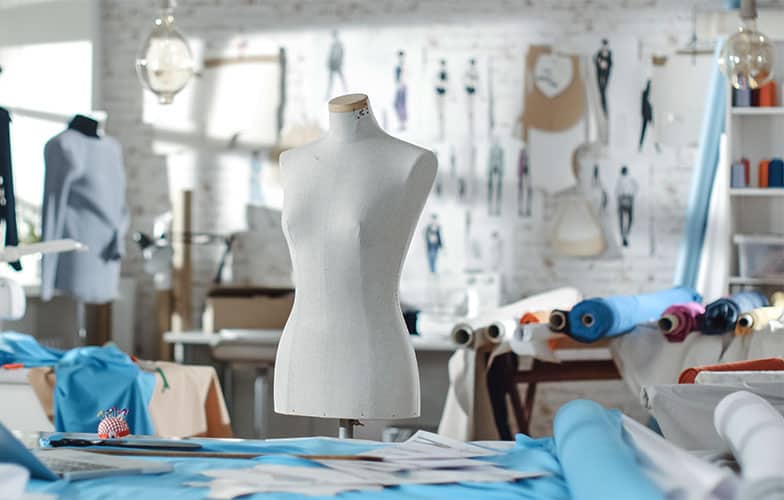
Your comprehensive Fit profile is professionally pattern cut & custom tailored in our in-house, quality controlled production unit. Fusing is done before finishing – that gives strength and stability and improves the shape and crease resistance of your blouse. If you opt for an embroidered blouse, we not only ensure that the embroidery looks neat without any hanging threads, but also take special care to check that none of the knots or stitches on the inner side of the blouse are abrasive to the skin
With extreme attention to detail and years of experience on our side, we are proud to say that we have mastered the art of making your blouse feel like second skin. The use of high-quality material & professional techniques will ensure that your blouse will look as good as new after multiple washes, without any colour fading or shrinkage. So whether you are a bride to be or are planning to attend a special event, do get in touch with us if you need a custom-made blouse for a head-turning outfit
Pro*Tips
From our designers
Fitting Sessions
Do carry the undergarments that you plan to wear with your blouse on the final day to your fitting sessions. This way, you can ensure that the blouse does not cling to the undergarment and that the fabric or colour of the undergarment does not peek through
Multi Purpose Designs
Consult the designer if you need a dramatic outfit for a special occasion but also want to reuse it later without looking too over the top. We could use creativity with running trends – for example, design a blouse with a detachable cape to flaunt two different looks with just one blouse!
